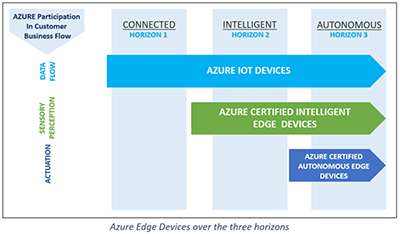News
Microsoft Touts Arm Partnership on Edge Devices and Azure Tools
- By Kurt Mackie
- October 09, 2020
Microsoft and Arm are collaborating on Azure developer tools for "intelligent edge devices" that use artificial intelligence (AI), per a Thursday Microsoft announcement.
Moe Tanabian, Microsoft's vice president and general manager for Azure edge devices, promised that Microsoft will deliver better Azure tools for developers in collaboration with Arm Holdings, a chip designer and long-time Microsoft partner. Arm didn't publish a similar announcement on Thursday, but it's currently getting acquired by Nvidia, another Microsoft chip partner, in a deal valued at about $40 billion.
The partnership with Arm will support Azure tooling for various "AI-enabled devices." Examples include "intelligent computer-vision-enabled cameras, connected vehicles, AI gateways and intelligent appliances," Tanabian indicated.
The fanless, low-power aspects of Arm-based processors are ideal for these sorts of edge devices, Tanabian added. Arm adds "silicon diversity" to the mix, which the edge-device industry needs, although it "can take more than a year" for developers to adapt to new silicon options, he noted.
Azure Certified Device Program
Microsoft last month announced a new Azure Certified Device Program for device builders, which currently offers three certifications. There's a certification offered for the Azure IoT Hub service. A second certification pertains to the IoT Plug and Play service. The third certification, called "Edge Managed," currently focuses on certifying "Edge runtime compatibility for module deployment and management."
More on Microsoft's new Azure device certification program is described at this GitHub page.
There's also a requirements program in the works for edge-device hardware partners. It's called the "Azure-Ready Silicon" Program, Tanabian indicated.
Future Microsoft programs for "Azure-certified intelligent edge devices" and "Azure-certified autonomous edge devices" apparently will be emerging as the industry evolves. At least that's the course suggested by the following chart from Microsoft's announcement:
 [Click on image for larger view.] Microsoft's edge-device industry evolution concept, with possible Azure certification programs to come (source: Oct. 8 Microsoft Tech Community post).
[Click on image for larger view.] Microsoft's edge-device industry evolution concept, with possible Azure certification programs to come (source: Oct. 8 Microsoft Tech Community post).
Intelligent Edge Vision
Microsoft has a three-stage vision on how the intelligent edge market will emerge, according to Tanabian.
The first stage (or "horizon") is called "connected." It'll occur when more devices connect to "cloud" datacenters, enabling remote monitoring and management of those devices via cloud-based services. The second stage, described as "intelligent," will kick in when edge devices start providing sensor data that enable insights. The third stage was deemed "autonomous," when "little to no human interaction" will be needed for the devices.
Microsoft tends to define an "edge device" differently from Wikipedia's definition, which talks about routers and switches.
Officials at Microsoft have typically characterized edge devices as offering compute capabilities that exist outside a service provider's datacenter infrastructure. An edge device might be used to harvest "signals" data or speed up a service by doing the initial processing.
When AI is used with an edge device, Microsoft uses the "intelligent edge device" term. This concept was explained a couple of years ago by Kevin Scott, Microsoft's chief technology officer.
About the Author
Kurt Mackie is senior news producer for 1105 Media's Converge360 group.